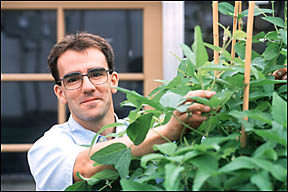|
|
|
|
|
|
INSIDE IOWA STATE November 30, 2001 Plant pathologist and sustainable ag enthusiast
When Adam Bogdanove graduated from Yale with a bachelor's degree in biology and a few credits in Japanese, he had no interest in pursuing an advanced degree. Instead, he headed to Japan for adventure as an English instructor. The adventure stretched into a four-year exploration of the rich culture and complex countryside that would shape his future in unexpected ways. Not only did he meet his future wife Naomi, Bogdanove also discovered his eventual profession. Bogdanove is settling into his second year as an assistant professor of plant pathology and a researcher in the Plant Sciences Institute's Center for Plant Responses to Environmental Stresses. "My stay in Japan was a formative time for me. The country is a juxtaposition of cities, mountains and fields of rice and vegetables wedged in with astounding economy of space. Japan is challenged by the small amount of land and the large population," he said. "I became interested in how ag biotechnology in plant disease research can help improve the environment by reducing ag chemical usage." Bogdanove returned to the United States for graduate school at Cornell University. Studying molecular plant pathology, he worked with a phytobacteriologist whose lab discovered the first pathogen molecule known to trigger plant defense responses. That molecule has been developed into a commercial product to aid growers, he said. "Seeing such an exciting discovery and watching it become practical really encouraged me." Bogdanove focused his research on bacteria, investigating the genetics and identifying genes important for disease and triggering plant defense. "Bacteria grow quickly and they're easy to manipulate genetically. You can do disease assays in days instead of weeks. Bacteria are good model organisms for studying plant disease resistance mechanisms," he said. After completing a USDA postdoctoral fellowship at Purdue University and the Boyce Thompson Institute at Cornell, Bogdanove interviewed at Iowa State for one of the first faculty positions supported by the Plant Sciences Institute. "One of the things that struck me about ISU this probably sounds hokey, but I think it's really true is the spirit of informal collaboration. People know each other, they know what others are doing, who has what equipment, or who knows how to do this or that," he said. "And it's not only informal. Iowa State is just packed with interdepartmental programs and committees and centers that bring people together all the time. The environment of collaboration here was very attractive to me." With his lab up and running and research proposals in the hopper one on disease resistance in soybeans, another involving a microbial genome-sequencing project Bogdanove is immersed in the basic science of plant-pathogen interactions. Yet his research goal remains grounded in the practical and has not strayed from his initial environmentalist impulse in Japan. "When I'm in the lab, I remind myself that the questions I'm asking in my research must be useful," he explained. "I want to advance knowledge of molecular mechanisms of plant responses to pathogens, including natural disease resistance, so we can devise means to better control disease and increase agricultural yields without broad use of potentially hazardous pesticides. "If we can understand all of the circuits that lead to this master switch to turn on plant defense, then we can find a way to jimmy the system and alter the regulation of a particular gene involved in plant defense," he said. "We can alter it to come on, not only when the plant detects one particular pathogen, but also in response to general stimulus from a variety of pathogens or through the lifetime of the plant." Bogdanove is cautiously optimistic that biotechnology will be used responsibly. "I'm not blind to the risks. Yet there's enough potential for good that we have to invest time and effort for careful risk and benefit analysis. Sometimes it's all too easy to get caught up in the excitement of the potential for good and fail to keep in mind the potential for harm. We need to think about how exciting discoveries in the lab will translate in the field and do the necessary follow-up." Although his appointment is 90 percent research, Bogdanove said he "teaches" all the time. "As a scientist, you are a teacher and a learner. Your job is to learn and teach others what you've learned. Every time you write a paper, you're teaching; every time you work with a student or technician in your lab, you're teaching. To me, the essence of science is learning and teaching," he said. |
|
Ames, Iowa 50011, (515) 294-4111 Published by: University Relations, online@iastate.edu Copyright © 1995-2001, Iowa State University. All rights reserved. |
